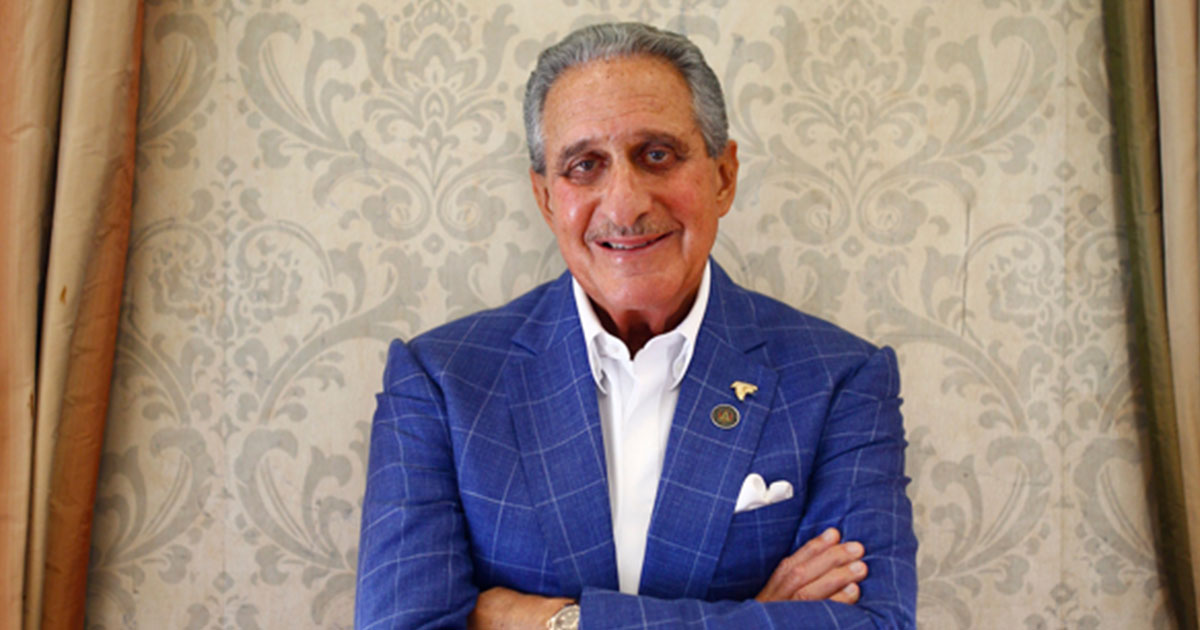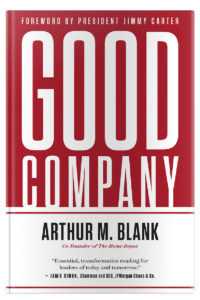An Inspiring Book Is Having a Big Impact at Babson

When he read the book Good Company, Scott Taylor was struck by how far ahead of his time the author, Arthur M. Blank ’63, H’98, was as a business leader.
The co-founder of The Home Depot, Blank came up at a time when an executive’s relationship with his employees was mainly hierarchical and transactional. A leader gave an order, and the employees followed it.
“Arthur Blank didn’t operate that way,” says Taylor, The Arthur M. Blank Endowed Chair for Values-Based Leadership at Babson’s Arthur M. Blank School for Entrepreneurial Leadership. “What is great about the book is that it shows how he leads. He describes relationships with associates, his clients and customers, his family. Those relationships undergird how he makes decisions.”

In Good Company, Arthur M. Blank ’63, H’98 lays out the six core values that are the bedrocks of his businesses.
Babson is now integrating the inspiring book, along with the core business values of Blank’s that it describes, into the student learning experience, both in and out of the classroom. “I would love to see how we can imbed it into the day you walk into Babson, when you walk into orientation, into FME,” says Taylor.
This sort of educational collaboration, between an entrepreneurial leader such as Blank and an entrepreneurial institution such as Babson, is not common. “This is a new kind of learning partnership,” says Donna Levin, The Blank School’s CEO. “I’m excited for our students, and I’m also excited to see what it will mean for business education.”
President Stephen Spinelli Jr. MBA’92, PhD thinks Good Company can be such an important tool in business education that he bought a copy for every Babson student. “I think it has a crucial message for our students, the entrepreneurial leaders of the future, to hear,” says Spinelli. “Arthur Blank shows how it’s possible to create both economic and social value, and that aligns exactly with what we teach at Babson.”
The Six Core Values
Good Company takes readers through the milestones of Blank’s multifaceted career, including how he launched the Atlanta United soccer team, turned around the struggling PGA TOUR Superstore retail chain, and built an impressive new stadium for his Atlanta Falcons football team. Blank views Good Company, which outlines his values-based approach to business and life, as a guidebook for business education and leadership.
In the book, he outlines the six core values that are the bedrocks of his businesses: Put People First, Listen and Respond, Include Everyone, Innovate Continuously, Lead by Example, and Give Back to Others.
Running a company using such people-centric values, says Taylor, is critical in today’s business environment. “Those businesses that figure that out will have a competitive advantage,” he says. “Those that don’t figure it out are struggling.” That’s because these values build trust in business relationships, and strong relationships are the key to a motivated workforce. “How do you get people to perform at their best?” says Taylor. “We have learned that human relationships flourish when there’s trust and empathy. When people feel their relationship matters, they perform better.”
“I think the book has a crucial message for our students, the entrepreneurial leaders of the future, to hear. Arthur Blank shows how it’s possible to create both economic and social value, and that aligns exactly with what we teach at Babson.”
Babson President Stephen Spinelli Jr. MBA’92, PhD
While Blank’s six core values serve as The Blank School’s foundation, Taylor says these values are in many ways already embedded into the fabric of Babson. “There is wonderful alignment there,” says Taylor. In FME, for instance, students are taught to think beyond themselves to the problems of the world and innovate ways to solve them. Or, consider the centers and institutes, which work to be inclusive, build relationships, and give back to others.
Now, the goal for Babson is take those values, along with the book that champions them, and make them an even bigger part of College life.
A Broad Impact
Plans are still evolving, but Taylor envisions Good Company having a broad impact at Babson. For starters, he points to how the book will become an essential part of his graduate leadership course, illustrating how effective a values-driven leader can be. “This book will be a case study,” Taylor says.
In the Undergraduate School, the book will serve as a basis for a newly designed course in which students will look in depth at the core values and try to put them into practice. At Babson Executive Education, Taylor envisions professors using the book as a way to help business leaders better understand their personal values and what they stand for.
Going forward, Taylor expects the centers and institutes to continue finding ways to incorporate the values and inspire the Babson community to practice them in their lives. Faculty also will be reading Good Company and talking about their reactions to the book, using it as a jumping off point to discuss what entrepreneurial leadership means to them. “We can use the book as a launch pad to inspire thinking,” says Taylor.
As the Babson community continues to read and engage with Good Company, Taylor is excited by how else the book may influence and inspire the College. “We are in the early stages of all this,” he says. “Who knows where the book and values will take us?”
Posted in Community




